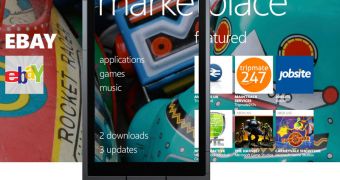Microsoft's new Windows Phone 7 operating system seems to appeal a lot to application developers out there, with over 18,000 of them already registering their interest in delivering software solutions for the platform.
This state of facts is also confirmed by the fact that there are over 4,000 applications already included in the Windows Phone Marketplace.
According to Al Hilwa, an analyst with research firm IDC, (via eWeek) the fact that Windows Phone 7 reached this achievement so fast is something that we should take into consideration when looking at the platform's future.
Moreover, he underlines the fact that Windows Phone 7 managed to reach this milestone in only several weeks after launch, while Google's Android OS topped 4,000 apps in the Android Market only after five months.
“The Windows Phone 7 Marketplace reaching 4,000 apps two months after launch has to be one of the most rapid ramp-ups in recent times, reaching this milestone faster than Android, which took from October 2008 to March 2009 to reach about the same level,” he wrote in a Dec. 19 research note.
“We can say that for a company that just a few months ago was an also-ran in mobile, having ten smartphones released in 30 countries is not a trivial achievement,” he continued. “I would not be surprised if Microsoft had the third largest app portfolio in the industry by the middle of next year.”
Provided that the Redmond-based software giant would indeed manage to attract as many developers on its side, the future of the platform itself would be brighter than some current estimations.
Many analysts suggested that the lack applications would prevent users from choosing Windows Phone 7 devices instead of Android-based ones, but that might change soon, apparently.
A strong development ecosystem would appeal a lot not only to application builders, but to end-users as well, and this is the main idea that can be extracted from Hilwa's research note.
“They have really strong application development tools and a strong developer ecosystem from their PC universe and they have been putting in a lot of effort to bring them over,” Hilwa stated.
“No one expected WP7 to take the market by a storm, but the role of the first release was to [put] Microsoft in the game. To be clear this is a long term battle that will be pivotal for Microsoft’s long-term relevance.”
Brought to shelves in October, Windows Phone 7 devices are experiencing slow sales around the world. The platform lacks a series of features that might have made it far more attractive, but it should receive some of them via upcoming software updates.
Previous reports on the matter suggested that, while the first generation Windows Phone 7 devices packed limitations that were seen as deal breakers, the next wave of such handsets would be more evolved, enjoying stronger appeal to end-users.
As for the app development area, Microsoft already showed that it is committed to provide developers with better tools, and that the development experience would be enhanced in the future as well.

 14 DAY TRIAL //
14 DAY TRIAL //